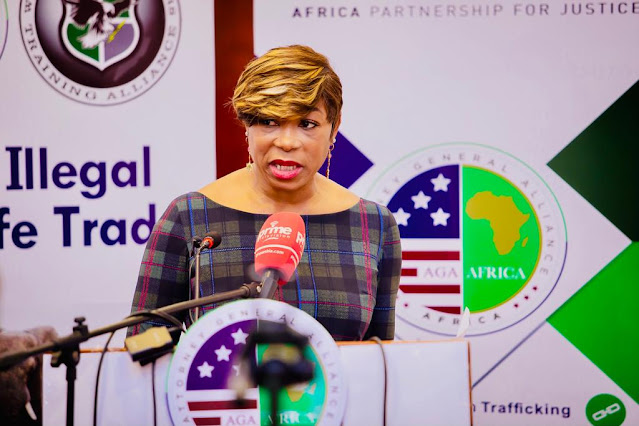What if the future is crypto? AGA-Africa prepares countries for cryptocurrency
 |
| Dr Freda Mwamba-Brazle is AGA-Africa country coordinator. |
 |
| It is estimated that 98 percent of darknet transactions are carried out in bitcoins. |
JACK ZIMBA
AS MORE and more of the global population moves into the virtual world,
cashless or digital transactions are becoming the norm.
This phenomenon has now given rise to cryptocurrency – virtual money or virtual
assets (VAs), whose use is now spreading across the globe.
Bitcoin and other cryptocurrencies are hotter than ever and taking hold even in
unlikely places.
In Kenya, for instance, a rural farming community is already using a form of
cryptocurrency called Sarafu to sell their produce.
But the virtual world is not devoid of criminals.
And so while bitcoin users tout it as the future of money, regulators are
urging caution.
Many African countries, for instance, have already issued warning on the use
cryptocurrency, while a number of other countries have not made any policy
statement on cryptocurrency.
In 2018, the Bank of Zambia urged people to be cautious with any currency that
was not regulated by any central bank, warning it could fuel money laundering,
financing activities of terrorism and general consumer protection risks such as
fraud and hacking.
But the indication is that cryptocurrency is here to stay and will only grow in
popularity. So how do we prepare for a world where cryptocurrency becomes the
norm?
Law enforcement agencies and organisations such as the Attorney General
Alliance Africa (AGA) have taken interest in this new phenomenon.
The AGA-Africa works with law agencies, sharing knowledge on how to combat
transnational financial crimes such as money laundering, human trafficking and
terrorism.
AGA-Africa does this by working with justice departments, and law enforcement
bodies such as the office of the attorney general, departments of public
prosecution, the police, academic bodies and other organisations in several
African countries, including Ghana, Kenya, Malawi, Nigeria, Rwanda, Uganda,
South Africa and Zambia.
Recently, AGA-Africa, in collaboration with the Financial Intelligence Centre
(FIC) and the Eastern and Southern Africa Anti-Money Laundering Group
(ESAAMLG), held a three-day virtual workshop to share knowledge on how to
combat crimes involving virtual assets.
AGA-Africa country coordinator Freda Mwamba-Brazle, who is also managing
partner for Innovatus Zambia, said during the workshop that while financial
innovations such as crypto assets are creating new methods of transmitting
value over the internet, their distinct features have also created new
opportunities for money launderers, terrorist financiers, and other criminals
to launder their proceeds or finance their illicit activities.
“Without a doubt, the ability to transact across borders rapidly has not only
allowed criminals to acquire, move, and store assets digitally, but it has also
complicated the origin or destination of the funds and make it harder for
reporting entities to identify suspicious activity in a timely manner,” said Dr
Mwamba-Brazle.
The workshop, which attracted participants from eight ESAAMLG members, and
local law enforcers such as the Zambia Police, was held on the basis that there
is varying and in some cases limited capacity and knowledge among supervisors
within the regional grouping on virtual assets.
The workshop was aimed at equipping participants with knowledge about virtual
assets and virtual asset service providers (VASPs), their different forms and how
they operate, including threats and vulnerabilities.
And of course what makes virtual assets really vulnerable is their anonymity,
which has greatly contributed to the boom in online and cross-border commerce
of illegal goods, particularly via what is now called the darknet.
It is estimated that 98 percent of darknet transactions are carried out in
bitcoins.
A study by the University of Technology Sydney in 2018 highlighted the high
association of bitcoin and illegal activities. The findings were published in
an article entitled “Sex, Drugs, and Bitcoin: How Much Illegal Activity Is
Financed Through Cryptocurrencies?”
“We find that approximately one-quarter of bitcoin users are involved in
illegal activity. We estimate that around US$76 billion of illegal activity per
year involves bitcoin, which is close to the scale of the US and European
markets for illegal drugs. The illegal share of bitcoin activity declines with
mainstream interest in bitcoin and with the emergence of more opaque
cryptocurrencies. Our findings suggest that cryptocurrencies are transforming
the black markets by enabling ‘black e-commerce’,” the study revealed.
The study also revealed that 25 percent of users and 44 percent of transactions
are associated with illegal activity in the bitcoin blockchain. It is estimated
that 24 million bitcoin market participants use the cryptocurrency for illegal
activities.
Zambia has already created a legal framework on virtual assets and virtual
asset service providers.
The Financial Intelligence Centre is a supervisor for VASPs, whose role is to
ensure the prevention of money laundering activities and other financial
crimes.
Mary Chirwa, who is director general of FIC, said the workshop was very
beneficial as it was aimed at capacitating her institution and other
supervisors in an area that is quite new in anti-money laundering and terrorism
or proliferation financing regime.
Ms Chirwa is also happy with the collaboration with other countries in
combating financial crimes, terrorism and human trafficking.
“Collaboration with agencies from other countries is essential when dealing
with issues of money laundering and other financial crimes which in many
instances transcend borders. Case studies show that collaboration with local,
regional and international counterparts is a cornerstone to successful
resolution of cases,” she said.
Mr Chirwa said challenges relating to limited knowledge and skills to supervise
VAs and VASPs are being addressed through trainings such as the one organised
by the AGA-Africa.
To Dr Mwamba-Brazle, the knowledge gained during the three-day workshop was
just a tip of the iceberg.
“There is so much more that you can learn on this topic and the knowledge that
you have acquired from this workshop should be shared with others but more importantly,
you should build off of it,” she said.



Comments
Post a Comment